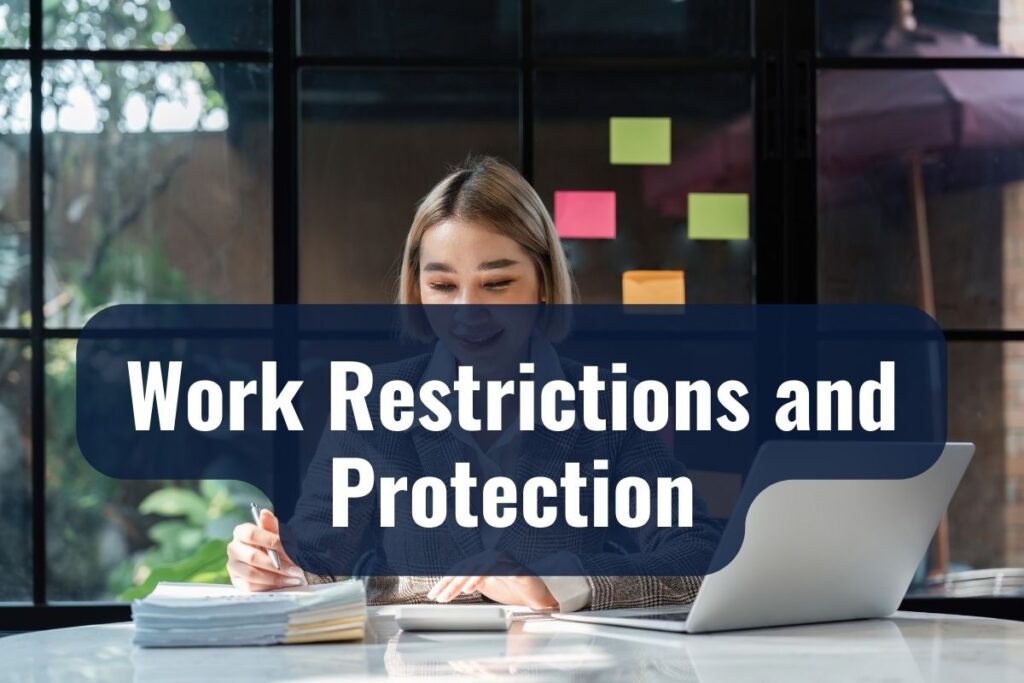

Having a baby is a life-changing experience filled with hope, excitement, and sometimes, a whole lot of questions—especially when you’re far from home.
Content showGermany has its own unique set of rules and regulations for maternity leave, and understanding them can feel like navigating through a maze. The good news? You’re not alone. This article aims to be your compass, guiding you through the essential information about maternity leave in Germany.
KEY TAKEAWAYS
Understanding the legal landscape surrounding maternity leave is an essential first step. Let’s demystify the German laws and see what they mean for you, in simple and straightforward terms.
The Maternity Protection Act (Mutterschutzgesetz) outlines the rights and protections expecting and new mothers are entitled to, from the period before your baby arrives until after you’ve given birth.
The Act ensures that mothers can prioritize their health and the well-being of their newborns without fearing job loss or workplace discrimination.
The Maternity Protection Act covers all women who are employed in Germany, regardless of whether they are full-time, part-time, or even on a temporary contract. The law also extends to trainees and apprentices.
Importantly, you don’t have to be a German citizen to be covered; you merely have to be employed in the country. However, freelance or self-employed women aren’t covered under this act.

Here in Germany, specific durations and timing guidelines surrounding maternity leave are designed to support both the mother’s and the child’s well-being.
The standard duration for maternity leave in Germany is 14 weeks—six weeks before the expected due date and eight weeks after childbirth. These durations are more than just guidelines; they are periods during which mothers are actually prohibited from working to ensure the safety and health of both mother and child.
Special considerations are given for premature and multiple births. In the case of a premature birth, the period after delivery can be extended to match the total 14 weeks of maternity protection. If you give birth to twins or more, your post-delivery leave is extended to twelve weeks.
If you feel healthy and choose to work during the six weeks leading up to your due date, you may do so, but this is entirely voluntary. Post-delivery, however, the eight-week no-work period is mandatory. In Germany, the protection of maternal and child health takes precedence, and working during this time is not allowed.
Some mothers opt to start their maternity leave earlier for medical or personal reasons. While the Maternity Protection Act outlines the standard durations, your doctor may recommend a longer period off work, especially if complications are expected. Such recommendations are generally well-respected and followed.
We’re here to guide you through the financial landscape of maternity leave in Germany. It’s not just about time off; it’s also about the monetary support you can expect during this precious period of your life.
One of the fundamental pillars of maternity leave in Germany is the maternity allowance, or “Mutterschaftsgeld.” This financial support is designed to help you manage your day-to-day expenses while you’re off work. It is generally calculated based on your net salary for the last three months before the start of maternity protection.
To qualify for maternity allowance, you need to be:
If you are privately insured or not eligible for statutory health insurance, you might still receive a lower maternity allowance from the German Federal Insurance Office (Bundesversicherungsamt).
Your health insurance plays a significant role in disbursing your maternity allowance. The payments are usually a collaborative effort between your employer and your health insurance provider. Your employer pays the difference between your regular salary and the amount the health insurance provides.
Besides maternity allowance, Germany also offers child allowance (Kindergeld) and parental allowance (Elterngeld), which are not exclusively tied to maternity but can offer significant financial relief during this time.

Applying for maternity leave in Germany is a well-defined process, and we’re here to guide you through it, one step at a time.
The first thing you’ll need is a medical certificate confirming your pregnancy and the expected date of delivery. You can obtain this certificate from your gynecologist, and it’s generally available after the first trimester. Once you have it, submit a copy to your employer and health insurance provider as soon as possible.
After submitting your medical certificate, the next point of contact is usually your Human Resources department. They will guide you through the internal procedures, deadlines, and other relevant details. Your health insurance provider will also give you insights into the maternity allowance and how it will be paid out.
Ideally, you should start the application process as soon as you enter your second trimester. While the deadlines may vary depending on your employer and health insurance, early application allows ample time for any adjustments or additional requirements.
If you’re facing any complications or special circumstances, discussing this early on with your medical provider and employer is crucial. Special extensions or accommodations are often possible but require documentation and sometimes, additional approvals.
In Germany, there are various options available for partners to actively participate in early parenthood, share responsibilities, and create everlasting memories as a growing family.
While not equivalent to maternity leave, paternity leave is an option for partners wishing to take some time off immediately following the birth of their child. The duration is generally shorter, and the terms may vary depending on your employment contract and company policies. However, paternity leave is increasingly becoming a standard practice in many German companies.
Parental leave or “Elternzeit” is a more flexible, longer-term option for both parents. Unlike maternity leave, which is exclusive to mothers, parental leave can be taken by either parent and can last until the child turns three.
While on parental leave, parents can apply for parental allowance (Elterngeld), which provides some financial support based on their income before the child’s birth.
Just like maternity leave, parental leave requires some planning and paperwork. Inform your employer at least seven weeks before you plan to start your parental leave. It’s also good to check with your employer if they offer any additional benefits during this period.
The key to making the most of these opportunities is open communication—with your employer and between each other as parents. Discuss your plans and wishes openly, so you can figure out the best way to share this special time with your family.

It’s only natural to wonder about your job security and work conditions when you’re stepping away to embrace motherhood. How will your career be affected? Can you return to your old job? How protected are you against job-related pressures during this sensitive time? You’re not alone in these thoughts, and Germany offers some reassuring answers.
Under the Maternity Protection Act, your employment is safeguarded from the moment you announce your pregnancy until the end of your maternity leave.
Employers are not allowed to terminate your employment during this period, ensuring that you can focus on your new role as a mom without the added stress of job insecurity.
The law also dictates certain work restrictions to protect your well-being and that of your newborn. For example:
Your employer is obligated to take additional health and safety measures to accommodate your needs during pregnancy. This might include ergonomic adjustments to your workspace or reassignment to less physically demanding tasks.
Maintaining an open dialogue with your employer can go a long way in ensuring a comfortable work environment. If you encounter any issues or have particular concerns, don’t hesitate to discuss them. Employers are generally well-versed in maternity protections and are obligated to adhere to them.
Once your maternity leave ends, you have the right to return to your previous position or a similar role at the same level of pay and conditions.
Your employer cannot penalize you for taking maternity leave, and you are entitled to any raises or benefits that you would have received had you not been on leave.
Germany’s social security system isn’t just rigid rules and formalities. There are other benefits and options to explore, some of which offer flexibility and added support that could be just what your unique situation requires.
Related: Cost of Living in Germany in 2023

The myriad rules, options, and formalities can sometimes make the German maternity leave system appear like an intricate maze. But here are some tips to help you navigate through it all, ensuring you can make the most of your maternity experience in Germany.